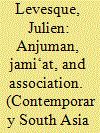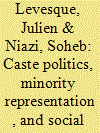|
|
|
Sort Order |
|
|
|
Items / Page
|
|
|
|
|
|
|
| Srl | Item |
| 1 |
ID:
193293


|
|
|
|
|
| Summary/Abstract |
In the early decades of the twentieth century in colonial India, the development of education, the expansion of electoral politics, and the decennial censuses led many caste communities, or ‘caste groups’, to organize collectively in search of internal solidarity and public assertion. Informed by the notions of service and reform, Muslims participated in this new associationism. Among them, the Sayyids – a privileged status group that claims descent from Prophet Muhammad – also formed their organizations. This article compares three Sayyid organizations in India and Pakistan, with two principal aims. First, it brings out the implicit notions of inclusion and exclusion that inform the functioning of the organizations as they seek community preservation. Second, it draws broader conclusions about associational forms available to South Asian Muslims when they act collectively on the basis of a shared social status or caste. The article concludes by delineating three ‘organizational models’ that Muslim caste groups can draw upon – the anjuman, the jami‘at, and the association. Overall, this article illustrates how Muslims frame practices of social distinction in an Islamic language of equality, piety, or service.
|
|
|
|
|
|
|
|
|
|
|
|
|
|
|
|
| 2 |
ID:
193288


|
|
|
|
|
| Summary/Abstract |
Social stratification among Muslims in South Asia, specifically the phenomenon of Muslim caste, has recently gained scholarly and media attention, particularly in India. However, the public discussion – often empirically shallow and politically polarized – fails to adequately explain the mechanisms through which Muslims perpetuate social inequality while invoking egalitarian principles. This special section, based on a panel held at the 2022 BASAS annual conference, aims to contribute to the scholarly and public discourse by advocating for the study of Muslim caste associations. Taking the associational life of caste into account provides a tangible object of study. Moreover, it shifts the focus away from macro-level discussions towards an empirically grounded analysis at the meso- and micro-levels. This introduction explores two central aspects. First, we suggest that caste associations offer a fresh perspective on the study of Muslim social mobility, beyond the oft-assumed imitation of dominant caste groups or Ashrafization. Second, documenting caste associations helps us understand the diversity of Muslim representation, specifically, the tension between Muslim minority politics and Muslim caste politics. Overall, this special section provides multiple examples of Muslims’ associational engagements with caste, which encompass endeavours as diverse as political assertion, declassing, social exclusion, or universal charitable aspirations.
|
|
|
|
|
|
|
|
|
|
|
|
|
|
|
|
|
|
|
|
|